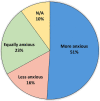Student Anxiety and Engagement with Online Instruction across Two Semesters of COVID-19 Disruptions
- PMID: 35496710
- PMCID: PMC9053020
- DOI: 10.1128/jmbe.00261-21
Student Anxiety and Engagement with Online Instruction across Two Semesters of COVID-19 Disruptions
Abstract
The sudden shift to online learning due to the COVID-19 pandemic left many instructors wondering how to minimize anxiety while keeping students engaged in their virtual courses. In this study, we explored (i) specific online instructional tasks that caused students to experience anxiety, (ii) factors that hindered student engagement with online instruction, and (iii) changes in student anxiety and engagement between spring 2020 and fall 2020. Students enrolled in STEM classes were surveyed at the end of spring 2020 (N = 425) and fall 2020 (N = 347) semesters. Our results show that the majority of student respondents had more anxiety in fall 2020 than in spring 2020 with online learning in general, and less anonymous class activities tended to cause the greatest anxiety. Distractions from the environment and personal technologies commonly prevented engagement in both semesters, but no significant differences were observed between the spring and fall. In contrast, more students reported that health-related stress, work-related stress, and issues with technology prevented participation in fall 2020 than in spring 2020. As institutions consider expanding their online course offerings post-pandemic, these data provide valuable insight into the challenges students experienced with online instruction that can inform future pedagogical choices.
Keywords: COVID-19; anxiety; engagement; instructional practices; online learning.
Copyright © 2022 Pennino et al.
Conflict of interest statement
The authors declare no conflict of interest.
Figures




Similar articles
-
Online learning during COVID-19 produced equivalent or better student course performance as compared with pre-pandemic: empirical evidence from a school-wide comparative study.BMC Med Educ. 2021 Sep 16;21(1):495. doi: 10.1186/s12909-021-02909-z. BMC Med Educ. 2021. PMID: 34530828 Free PMC article.
-
Undergraduates' Experiences with Online and in-Person Courses Provide Opportunities for Improving Student-Centered Biology Laboratory Instruction.J Microbiol Biol Educ. 2022 Apr 7;23(1):e00289-21. doi: 10.1128/jmbe.00289-21. eCollection 2022 Apr. J Microbiol Biol Educ. 2022. PMID: 35496687 Free PMC article.
-
BME Labs in the Era of COVID-19: Transitioning a Hands-on Integrative Lab Experience to Remote Instruction Using Gamified Lab Simulations.Biomed Eng Educ. 2021;1(1):99-104. doi: 10.1007/s43683-020-00015-y. Epub 2020 Aug 20. Biomed Eng Educ. 2021. PMID: 35146492 Free PMC article.
-
Student engagement in online learning in Latin American higher education during the COVID-19 pandemic: A systematic review.Br J Educ Technol. 2022 May;53(3):593-619. doi: 10.1111/bjet.13190. Epub 2022 Feb 15. Br J Educ Technol. 2022. PMID: 35600418 Free PMC article. Review.
-
Rapid Changes in Teaching and Learning: The Response of Teachers and Students in Dual Credit Courses to Online Learning During the COVID-19 Pandemic.2023 Nov. In: RTI Press Policy Brief [Internet]. Research Triangle Park (NC): RTI Press; 2010–. 2023 Nov. In: RTI Press Policy Brief [Internet]. Research Triangle Park (NC): RTI Press; 2010–. PMID: 38588373 Free Books & Documents. Review.
Cited by
-
Factors influencing Chinese EFL students' online learning anxiety in the post-COVID-19 era.Heliyon. 2024 Feb 14;10(4):e26112. doi: 10.1016/j.heliyon.2024.e26112. eCollection 2024 Feb 29. Heliyon. 2024. PMID: 38390135 Free PMC article.
-
Student reflections on emotional engagement reveal science fatigue during the COVID-19 online learning transition.J Microbiol Biol Educ. 2024 Dec 12;25(3):e0009324. doi: 10.1128/jmbe.00093-24. Epub 2024 Nov 8. J Microbiol Biol Educ. 2024. PMID: 39513725 Free PMC article.
-
The Implications of Virtual Learning on Plastic Surgery Education: A National Survey of Plastic Surgery Residents and Fellows.Plast Reconstr Surg Glob Open. 2023 Nov 3;11(11):e5373. doi: 10.1097/GOX.0000000000005373. eCollection 2023 Nov. Plast Reconstr Surg Glob Open. 2023. PMID: 37928640 Free PMC article.
-
Opportunities and Challenges of Online Instruction and Effective Pedagogy That Blurs the Lines between Online and On-Site Teaching and Learning.J Microbiol Biol Educ. 2022 Apr 11;23(1):e00047-22. doi: 10.1128/jmbe.00047-22. eCollection 2022 Apr. J Microbiol Biol Educ. 2022. PMID: 35496714 Free PMC article. No abstract available.
-
Unlocking learning: exploring take-home examinations and viva voce examinations in microbiology education for biomedical laboratory science students.J Microbiol Biol Educ. 2025 Apr 24;26(1):e0019324. doi: 10.1128/jmbe.00193-24. Epub 2024 Dec 23. J Microbiol Biol Educ. 2025. PMID: 39714146 Free PMC article.
References
-
- Trust T, Whalen J. 2020. Should teachers be trained in emergency remote teaching? Lessons learned from the COVID-19 pandemic. J Technology and Teacher Education 28:189–199.
-
- Crawford J, Butler-Henderson K, Jurgen R, Malkawi B, Glowatz M, Magni P, Burton R, Lam S. 2020. COVID-19: 20 countries’ higher education intra-period digital pedagogy responses. JALT 3.
-
- Barber PH, Shapiro C, Jacobs MS, Avilez L, Brenner KI, Cabral C, Cebreros M, Cosentino E, Cross C, Gonzalez ML, Lumada KT, Menjivar AT, Narvaez J, Olmeda B, Phelan R, Purdy D, Salam S, Serrano L, Velasco MJ, Marin EZ, Levis-Fitzgerald M. 2021. Disparities in remote learning faced by first-generation and underrepresented minority students during COVID-19: insights and opportunities from a remote research experience. J Microbiol Biol Educ 22. doi:10.1128/jmbe.v22i1.2457. - DOI - PMC - PubMed
LinkOut - more resources
Full Text Sources
Research Materials
